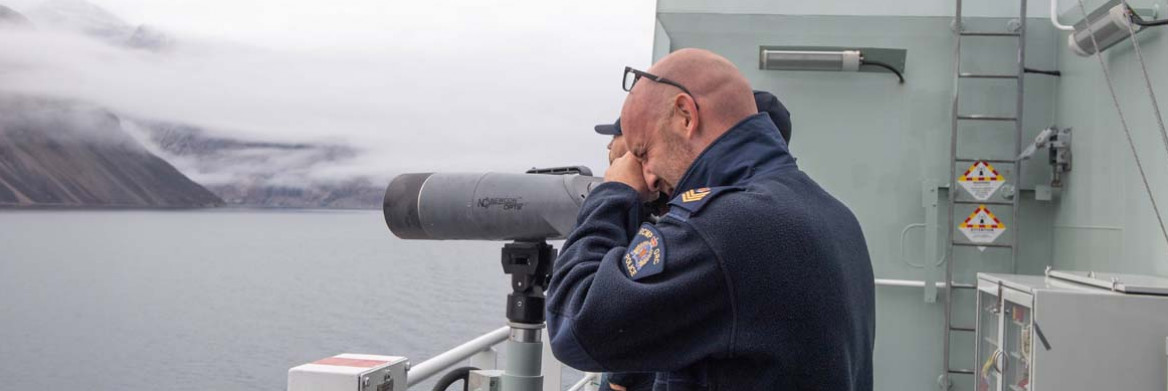Related link
As climate change reshapes the Arctic and opens sea routes that could threaten Canada's sovereignty, the RCMP is working to further define its role in this changing northern landscape.
"Arctic sovereignty is well defined on the land and inland waterways," says Sergeant Jean-Luc Bédard, Arctic manager with Federal Policing Criminal Operations (FPCO)'s Border Integrity Program. "But, there is a gap in the maritime environment. What better way to fill it than to partner and engage with other government departments?"
Arctic partners
The issues that affect Canada in the Arctic involve international disputes over who holds sovereignty over the Northwest Passage and the Canada–U.S. boundary in the Beaufort Sea. As a result, Bédard says the region can benefit from enhanced co-operation between government departments and partners. "We want to advance and establish the RCMP as the Canadian law-enforcement authority on Arctic waters," he says.
It's why nine RCMP officers spent part of the summer in 2022 determining how the organization will strengthen collaboration in the Arctic with its federal partners — the Canadian Armed Forces (CAF), the Canadian Coast Guard, and the Canada Border Services Agency.
The group spent time aboard HMCS Margaret Brooke, one of Canada's newest Arctic offshore patrol vessels for the Royal Canadian Navy, from August to September. Their discussions included exploring how the patrol ship might be used to support the Canadian Armed Forces's and RCMP's duties in the North.
"In 30 years, I'm expecting open water in the Arctic," says Bédard, who predicts that access will lead to an increase in maritime traffic and economic interest in the region. "Ultimately, it's going to increase border security concerns over organized crime, terrorism, and national security."
Operation Nanook
On board HMCS Margaret Brooke, the RCMP officers took part in a naval exercise called Operation Nanook. It's designed to secure Canada's North and is held annually in co-operation with Arctic countries such as the United States and Denmark.
During the exercise, the ship sailed to the High Arctic and navigated parts of the Northwest Passage, allowing officers on board to gain experience in border security, maritime operations, and national intelligence.
"Part of the goal is to see how we can integrate properly and meaningfully into the Navy," says Iqaluit-based Corporal Abdelmalek Mezdour, who was on board from Aug. 22 to Sept. 3.
That integration includes observing the operation of the ship, having access to the vessel, and participating in meetings with naval leaders and security partners.
Small but steady presence
On a smaller scale, RCMP officers have for years been patrolling the waters off Tuktoyaktuk, Northwest Territories, situated north of the Arctic Circle on the shores of the Arctic Ocean. "The maritime traffic is light but has been slowly increasing every year," says Staff Sergeant Jody Achtymichuk, who has patrolled the area.
In 2022, the patrol season on board the RCMP's Zodiac vessel lasted seven weeks. This year, the Federal Arctic Unit in the Northwest Territories used a larger, more durable Titan patrol vessel with updated onboard technology.
"We're a small footprint on the Arctic Ocean. Like one small patrol car on a long highway," says Achtymichuk.
Resource potential
Retreating sea ice also creates a challenge for border patrols by removing an obstacle to those wanting to expand resource exploration in the North.
Chief Superintendent Jeff Christie, the former criminal operations officer for the Northwest Territories, says knowing how growing resource development and commercial activity will proceed in the North is a legitimate question for police to ask. Those developments will lead to more people and criminal activity in the region.
"What does that future look like for policing?" he asks. "We have to work with other partners to define what that is."
